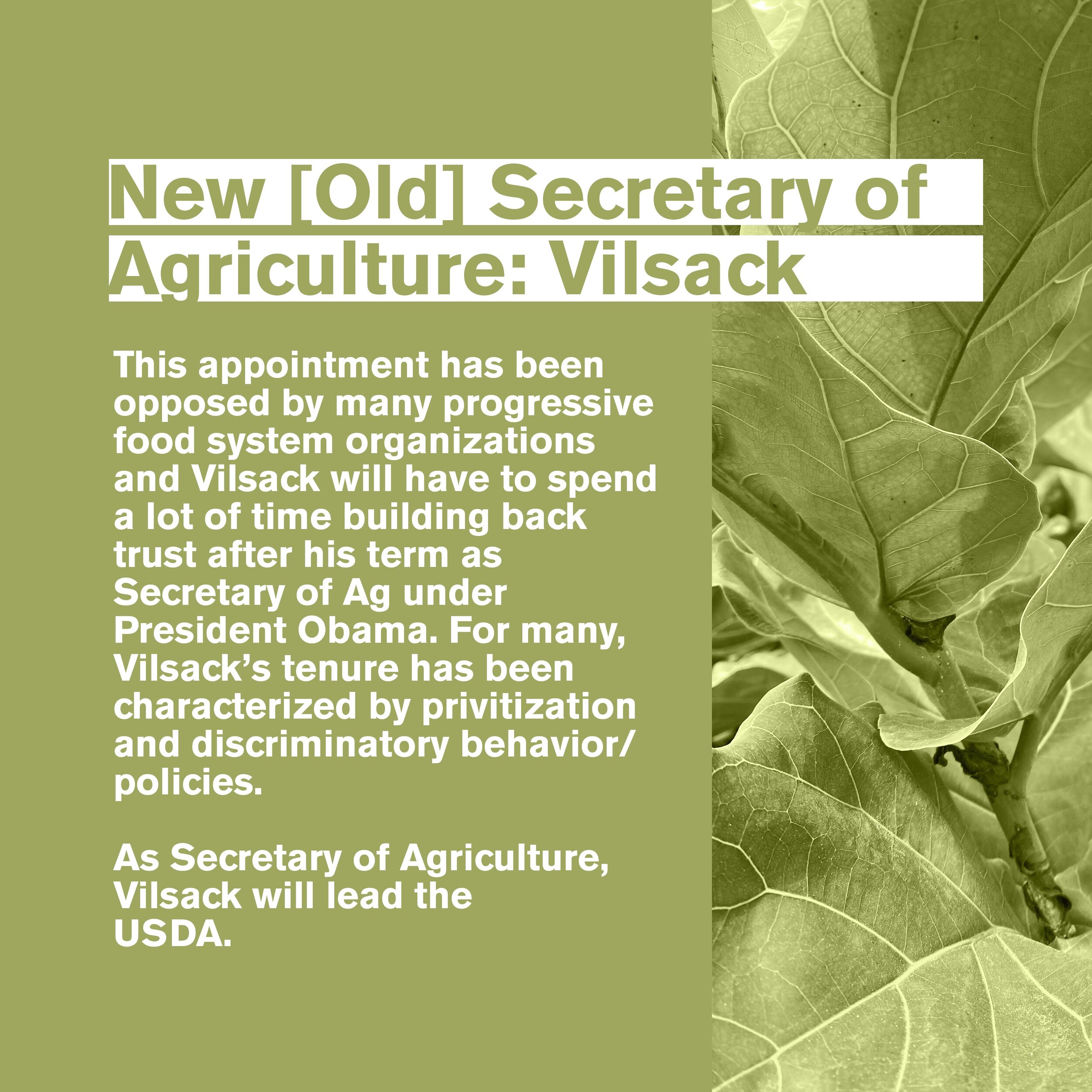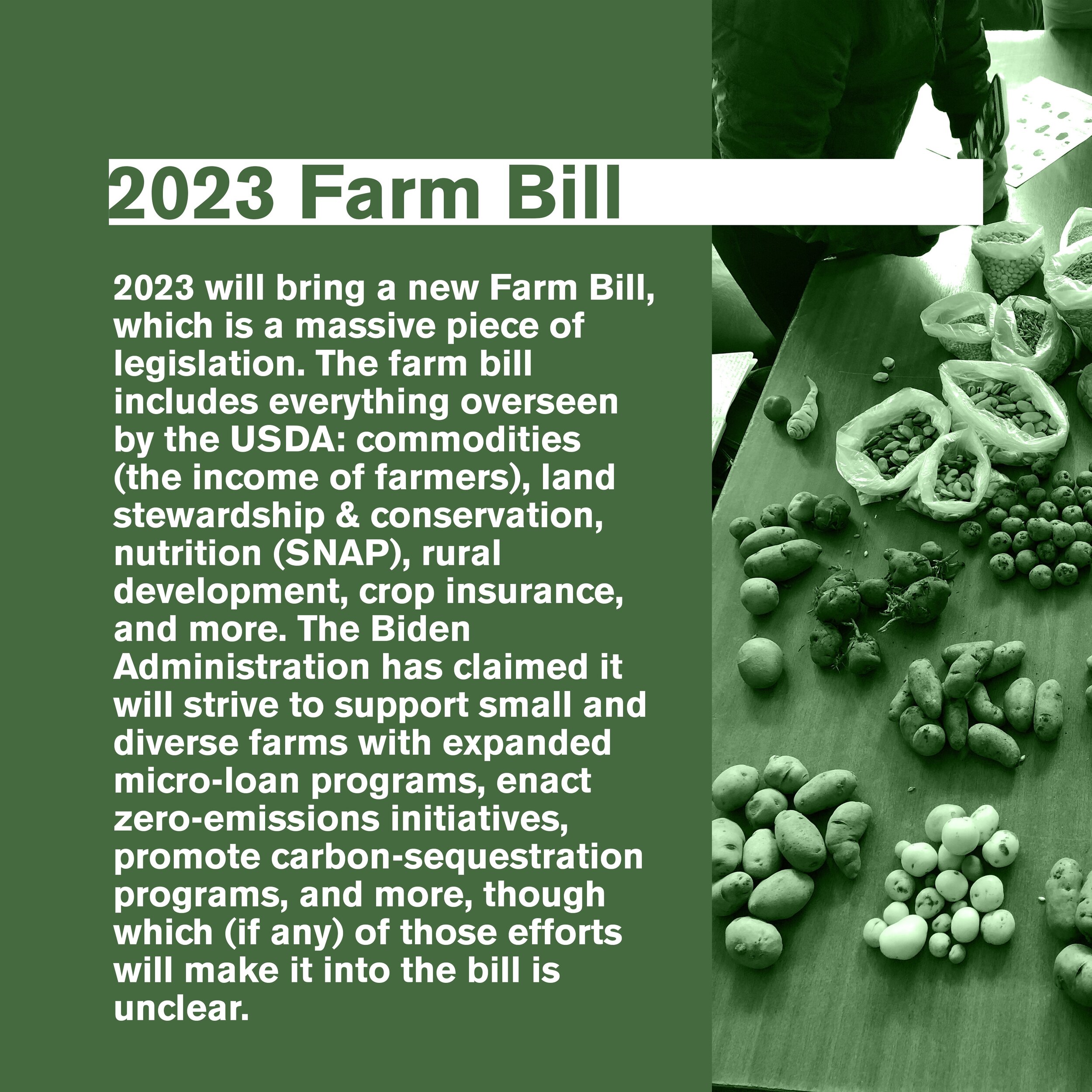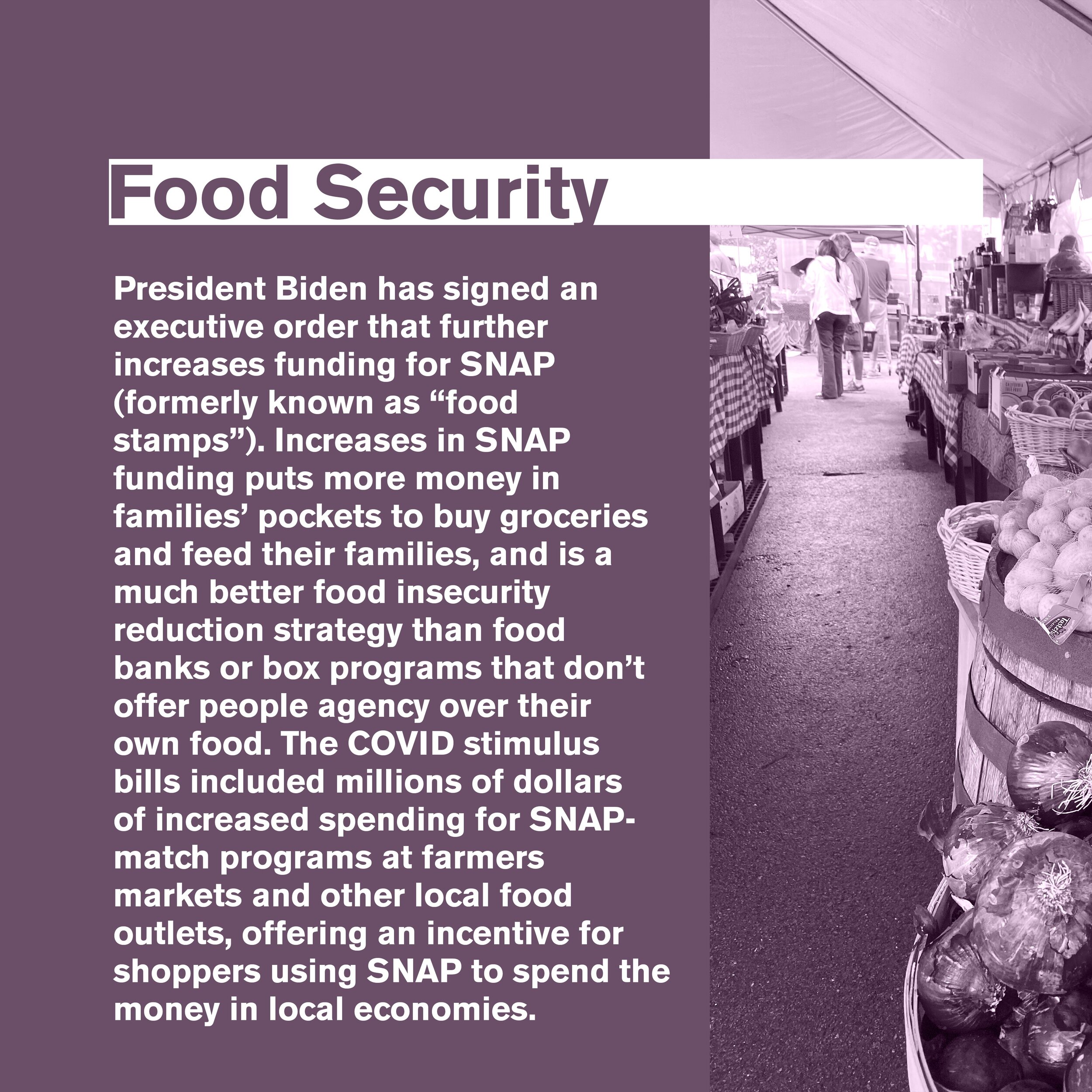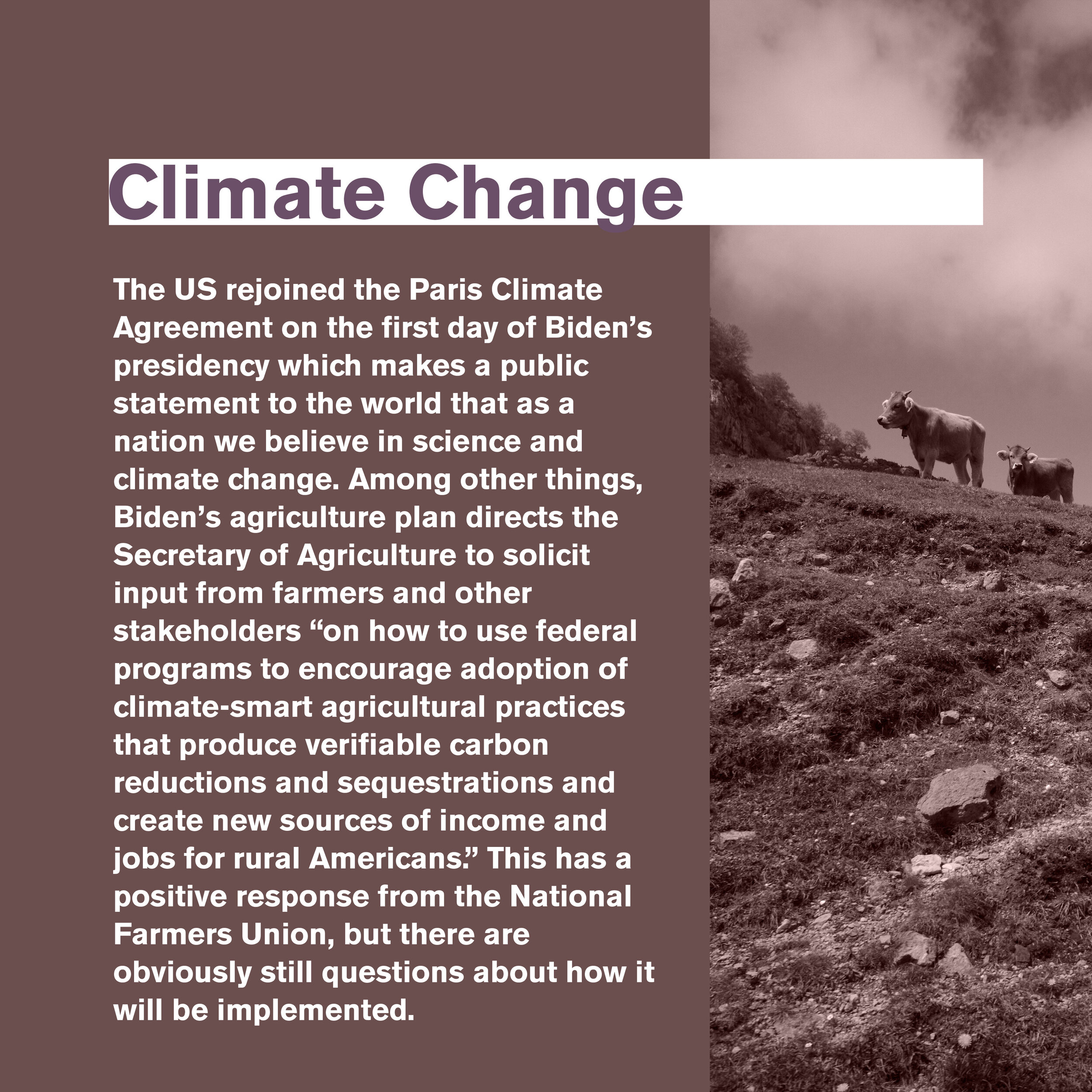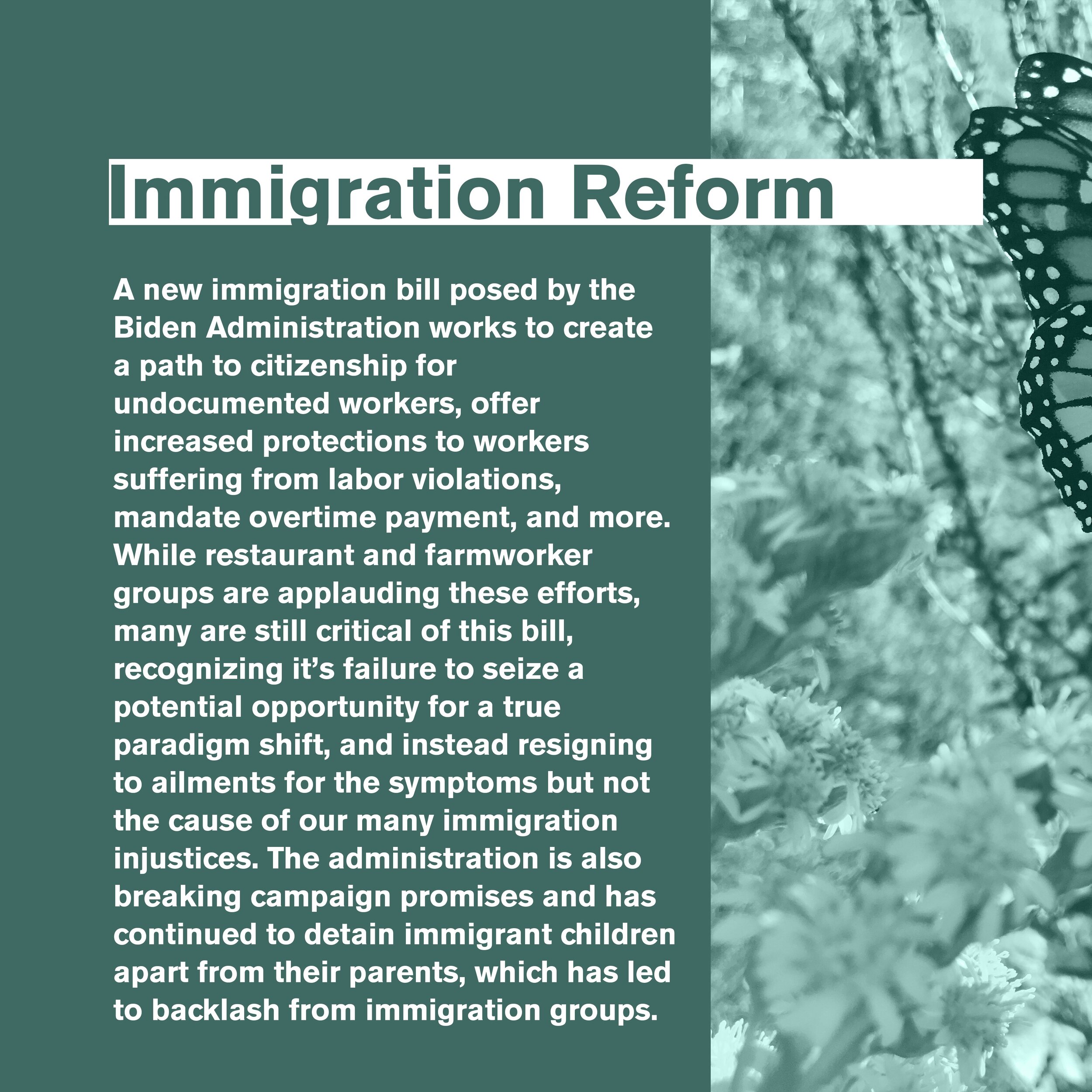March 2021 Policy Updates
New (Old) Secretary of Agriculture:
This appointment has been opposed by many progressive food system organizations and Vilsack will have to spend a lot of time building back trust after his term as Secretary of Ag under President Obama. For many, Vilsack’s tenure has been characterized by efforts to privatize food-factory inspection (which allowed for higher likelihoods of poor/unsafe working conditions), cooperation with companies like Monsanto that have prioritized large commercial farms and left small-scale operations to suffer, discriminatory behavior from his administration that led to highly disproportionate foreclosures on Black and BIPOC farms (which led to a decline in Black and BIPOC farms that was obscured by a manipulation of census data), and an administration that had a history of ignoring or side-stepping discrimination complaints.
As Secretary of Agriculture, Vilsack will lead the USDA (United States Department of Agriculture) which covers more than just farming policy. The USDA also oversees all food assistance programs (SNAP or “food stamps”), local food promotion programs, forestry and land management, the parks service, rural development initiatives and food safety regulations. There is a lot of money coming from the COVID stimulus packages that will go through the USDA in the form of increased SNAP payments and increased grant dollars for farmers, farmers markets and social assistance organizations.
2023 will bring a new Farm Bill, which is a massive piece of legislation. The farm bill includes everything overseen by the USDA: commodities (the income of farmers), land stewardship & conservation, nutrition (SNAP), rural development, crop insurance, and more. The Biden Administration has claimed it will strive to support small and diverse farms with expanded micro-loan programs, enact zero-emissions initiatives, promote carbon-sequestration programs, and more, though which (if any) of those efforts will make it into the bill is unclear.
Food Security:
President Biden has already signed an executive order that further increases funding for the Supplemental Nutrition Assistance Program (SNAP, formerly known as “food stamps”). Increases in SNAP funding puts more money in families pockets to buy groceries and feed their families, and is a much better food insecurity reduction strategy than food banks or box programs that don’t offer people agency over their own food. SNAP also leads to increased spending in local areas. The COVID stimulus bills included millions of dollars of increased spending for SNAP-match programs at farmers markets and other local food outlets, offering an incentive for shoppers using SNAP to spend the money in local economies.
Climate Change:
The US rejoined the Paris Climate Agreement on the first day of Biden’s presidency which makes a public statement to the world that as a nation we believe in science and climate change. There is still a lot of work to do to meet the goals of the agreement to limit the global temperature increase in this century to 2 degrees Celsius above preindustrial levels, but as one of the largest polluting countries in the world, it is essential that we renter this agreement and showcase our commitment as a global partner in the fight against climate change.
Among other things, Biden’s agriculture plan prioritizes increasing carbon sequestration in the agriculture sector and directs the Secretary of Agriculture to solicit input from farmers and other stakeholders “on how to use federal programs to encourage adoption of climate-smart agricultural practices that produce verifiable carbon reductions and sequestrations and create new sources of income and jobs for rural Americans.” This has a positive response from the National Farmers Union, but there are obviously still questions about how it will be implemented. The administration currently sees an expansion of the Conservation Stewardship Program (CSP) as one potential avenue through which carbon sequestration efforts can push the agriculture industry toward “zero-emissions”. Another avenue involves plans to incentivize biofuel production, however this plan has fallen under scrutiny as it may “reward large farms that generate huge amounts of waste or grow monoculture [crops] that [degrade] the environment”.
Immigration Reform:
A new immigration bill posed by the Biden Administration works to create a path to citizenship for undocumented workers, offer increased protections to workers suffering from labor violations, mandate overtime payment, and more. While restaurant and farmworker groups are applauding these efforts, many are still critical of this bill, recognizing it’s failure to seize a potential opportunity for a true paradigm shift, and instead resigning to ailments for the symptoms but not the cause of our many immigration injustices. The administration is also breaking campaign promises and has continued to detain immigrant children apart from their parents, which has led to backlash from immigration groups.
Additional Reading:
https://www.nytimes.com/2021/01/26/dining/usda-food-policy-biden.html
https://nfu.org/2021/01/28/how-bidens-executive-orders-will-affect-food-and-agriculture/
https://sustainableagriculture.net/our-work/campaigns/fbcampaign/what-is-the-farm-bill/
https://civileats.com/2020/12/11/op-ed-dear-secretary-of-agriculture-this-is-your-chance/
https://www.motherjones.com/food/2020/12/biden-vilsack-usda-agriculture-shirley-sherrod/
https://thecounter.org/biden-usda-tom-vilsack-ag-secretary-backlash/
https://brownfieldagnews.com/news/farm-bureau-wants-safety-net-strengthened-in-next-farm-bill/
https://jacobinmag.com/2021/03/joe-biden-immigration-reform-us-citizenship-act
https://www.foodandwine.com/news/biden-immigration-plan-restaurants-farm-workers

